Dark Victory Blu-ray Movie
HomeDark Victory Blu-ray Movie 
Warner Bros. | 1939 | 104 min | Not rated | Jun 09, 2015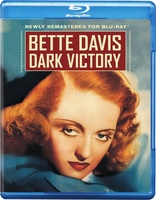
Movie rating
7.2 | / 10 |
Blu-ray rating
| Users | 0.0 | |
| Reviewer | 3.5 | |
| Overall | 3.5 |
Overview
Dark Victory (1939)
A young socialite is diagnosed with an incurable brain tumor, and must decide how to spend her final days.
Starring: Bette Davis, George Brent, Geraldine Fitzgerald (I), Humphrey Bogart, Henry TraversDirector: Edmund Goulding
| Romance | Uncertain |
| Melodrama | Uncertain |
| Drama | Uncertain |
Specifications
Video
Video codec: MPEG-4 AVC
Video resolution: 1080p
Aspect ratio: 1.37:1
Original aspect ratio: 1.37:1
Audio
English: DTS-HD Master Audio Mono (48kHz, 24-bit)
Spanish: Dolby Digital Mono
Spanish: Dolby Digital Mono (Spain)
Subtitles
English SDH, French, Spanish
Discs
25GB Blu-ray Disc
Single disc (1 BD)
Playback
Region A, B (C untested)
Review
Rating summary
| Movie | 4.0 | |
| Video | 3.5 | |
| Audio | 3.0 | |
| Extras | 2.5 | |
| Overall | 3.5 |
Dark Victory Blu-ray Movie Review
As Those Bette Davis Eyes Go Dim
Reviewed by Michael Reuben June 8, 2015The three-hanky tearjerker, Dark Victory, was a huge success for Warner Brothers in 1939, even though it was considered an unlikely prospect. The original play bombed on Broadway in 1934. MGM's super-producer, David O. Selznick, had acquired the film rights but failed, after several years of effort, to get the project off the ground; at different times, both Greta Garbo and Merle Oberon were considered for the demanding lead role. Studio head Jack Warner didn't want to make the film, because he thought no one would want to see a story about a woman who goes blind and dies. But Warner was overruled, and ticket sales were brisk, and the reason for both was one person: Bette Davis. By 1939, Davis was firmly established as one of Warner Brothers' most bankable stars. Even if the studio had doubts, it was not about to antagonize so valuable an asset. Once Davis decided that she wanted to play the doomed heroine of Dark Victory, she was relentless in her pursuit of the rights, which were eventually acquired from Selznick by producer Hal Wallis, when Selznick decided to devote himself full time to Gone with the Wind. Edmund Goulding (Grand Hotel ) agreed to direct from a script written by Casey Robinson (Captain Blood). The result was one of those rare films where a single star performance overwhelms the many objections that the material raises at almost every moment. The story is manipulative, the sentiments frequently maudlin, the behavior of many characters questionable and the medical science ridiculous—and no one cared. Davis' turbulent portrayal of a young and formerly carefree woman suddenly confronted with a terminal illness is so complex and involving that it sweeps aside the many objections raised by the film's plot. If anyone wants to list good arguments for dramatic license, Bette Davis in Dark Victory should be near the top.
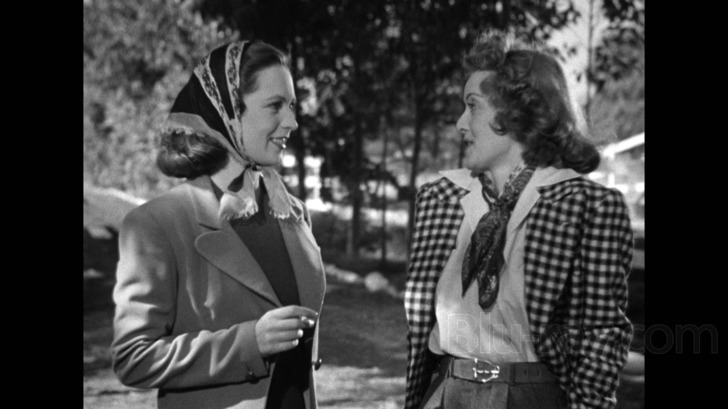
Judith Traherne (Davis) is a spoiled heiress whose wealthy family remains conveniently absent. Her father drank himself to death, and her mother has moved to Paris. Judith lives in a Long Island mansion with her friend and secretary, Ann King (Geraldine Fitzgerald), and a staff of loyal servants who deal with the constant flow of society guests. These include the handsome but indolent Alec (Ronald Reagan), who has loved Judith for years without any hope of his affections being returned. Judith's great passion in life is horseback riding, and she has recently hired a top Irish trainer, Michael O'Leary (Humphrey Bogart, woefully miscast), whose advice she routinely ignores. Almost from the film's opening, however, Judith's breezy life is clouded by increasingly severe symptoms of which she's so fearful that she has become brittle and short-tempered: fierce headaches, double vision, clumsiness, eventually a riding mishap. Overcoming Judith's stubborn objections, Ann makes her consult the family doctor, Parsons (Henry Travers), who in turn calls in a specialist, Dr. Frederick Steele (George Brent). Judith and Dr. Steele meet under circumstances that mirror each other: She doesn't want to see any more doctors, and he doesn't want to see any more patients. A renowned neurosurgeon, Steele is retiring from practice to devote his time to pure research, because he is weary of fighting losing battles against diseases he can't cure. But something about Judith moves Dr. Steele to take on one last patient. Maybe he sees the desperation and terror she manages to hide from everyone else under a blithe exterior. Or maybe it's something else. In any case, Steele diagnoses a brain tumor and operates to remove it. From this point onward, Dark Victory requires a great deal from viewers by way of suspension of disbelief, especially today when audiences are more sophisticated about cancer and its treatment. Judith's condition after surgery is the ideal "movie disease". She recovers quickly with no side effects and full functionality. But every specialist who reviews her history and test results reaches the same conclusion—"prognosis: negative" (the phrase has a key role in the story). Nevertheless, Judith will be able to live normally for a period of months, without debilitating treatments or depressing hospital stays. The end will come quickly and painlessly, heralded only by the dimming of her sight. The purpose of such an artificial construct is to clear away medicine to make room for melodrama. With Judith's path toward death so neatly laid out, Dark Victory is free to focus on how she travels it. The first complication arises when Drs. Steele and Parsons agree not to tell her about her condition—a decision that was almost certainly unethical even then and no doubt arises from Steele's loss of professional detachment because he has fallen in love with his patient. Judith, too, believes she has found her soul mate in Dr. Steele, which makes the feeling of betrayal all the more devastating when she discovers, as she inevitably must, the true nature of her prognosis. The scene in which Judith lashes out at both Dr. Steele and Ann (with whom he has shared the truth) is both painful and invigorating—the latter because no movie star has ever surpassed Bette Davis in making a display of anger thoroughly entertaining. Once Judith knows her fate, she must decide how to spend her remaining time. Some commentators have questioned whether the characters played by Bogart and Reagan are necessary to the story, but they serve a crucial function here as representatives of Judith's life to date. When she does decide on the life she wants for her final months, it is nothing like the one that has come before, and her final moments are very different from what you would have expected from the woman who first appeared on screen.
Dark Victory Blu-ray Movie, Video Quality 
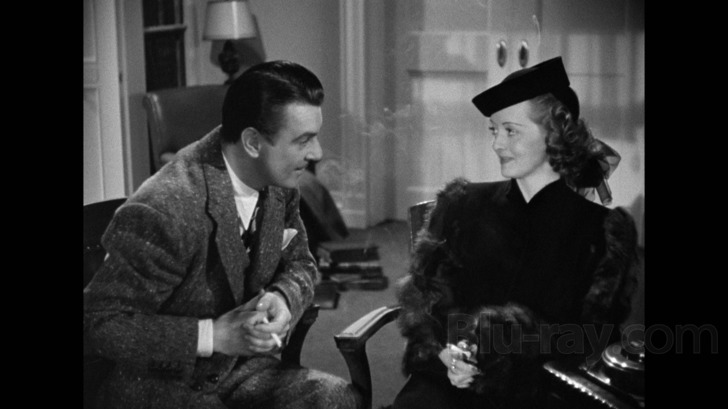
Dark Victory's cinematographer Ernest Haller had been shooting in black-and-white since the Twenties, but after lensing this film in 1939, he went on photograph his first production in color, which was the film that won him an Oscar (Gone with the Wind). Still, Haller was a master of blacks and grays, and he knew how to light Bette Davis to best effect, having shot her Oscar-winning performance in the previous year's Jezebel. Warner's 1080p, AVC-encoded Blu-ray has been sourced from the original camera negative, and it is a good catalog effort, featuring solid blacks, well-delineated grays and good contrast. The grain pattern appears to be natural and undisturbed by electronic manipulation. Sharpness and detail are good enough that it is easy to distinguish between Davis and her stunt double during the riding scenes and, on a positive note, the elaborate wardrobe that Judith can afford looks fabulous, even without the benefit of color. Warner has mastered Dark Victory on a BD-25 with an average bitrate of 20.94 Mbps, but the film looks better than that low number suggests. This appears to be a case where a compressionist made the effort to "massage" the bit allocation to conserve where possible (notably during talking head scenes) and allow more bandwidth for scenes like those of Judith riding or driving.
Dark Victory Blu-ray Movie, Audio Quality 
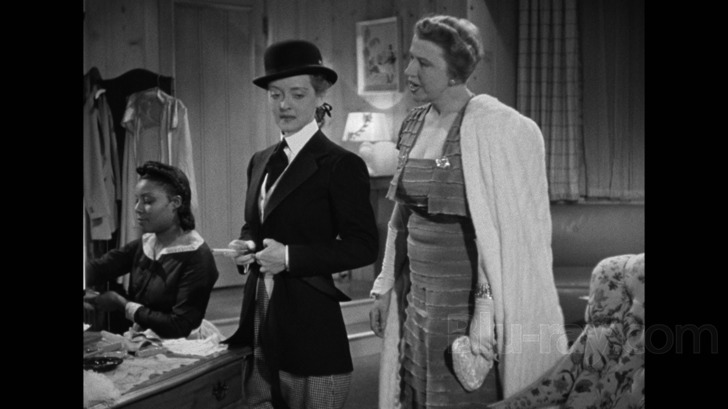
The film's original mono soundtrack has been encoded as DTS-HD MA 1.0, and it's merely OK. The track has been encoded at a low volume, requiring a boost from one's amplifier or TV set. With that boost comes audible background hiss, which is something you don't usually hear on Warner's mono tracks. It's not a deal breaker, but it is worth noting. With elevated volume, the dialogue is clear and so are the sound effects. The emotional score is by Max Steiner, whom Davis complained about during production, because she didn't want his music to compete with her acting, particularly near the end of the film.
Dark Victory Blu-ray Movie, Special Features and Extras 

Warner first released Dark Victory on DVD in 2000 with only a trailer. A second DVD release in 2005 added a commentary and featurette. All of these extras have been ported over to this Blu-ray, with the addition of a "Warner Night at the Movies" gallery of short subjects.
- Commentary by Film Historian James Ursini and CNN Film Critic Paul Clinton: Of the many commentaries that Warner has included with its classics, this is by far the most disappointing I have heard. Neither Ursini nor Clinton appears to be a fan of the film, and neither offers the kind of dense factual background that one finds on commentaries by, e.g., Dr. Drew Casper (see White Heat for an example). The commentators generally limit themselves to discussing the action on screen, and there are many pauses.
- Warner Night at the Movies: This series of short subjects is available under both "Special Features" (where a "play all" option is provided) and, optionally, under "Play" as an introduction to the main feature.
- The Roaring Twenties Trailer (480i; 1.37:1; 3:31): Hosted and narrated by producer and writer Mark Hellinger.
- Newsreel (480i; 1.37:1; 2:05): The bulk of this news report is devoted to King George VI's visit to Canada and America in May-June 1939.
- Old Hickory (480i; 1.37:1; 16:50): A 1939 short dramatizing several incidents from the life of President Andrew Jackson (Hugh Sothern).
- Robin Hood Makes Good (480i; 1.37:1; 7:47): In this 1939 Merrie Melody, a trio of singing squirrels decide to play "Robin Hood" and nearly fall victim to a duplicitous fox. The same cartoon was included on the recently released Blu-ray of Robin and the 7 Hoods.
- 1939: Tough Competition for Dark Victory (480i; 1.37:1; 9:33): What's notable about the collection of critics and historians gathered for this 2005 featurette (which includes Ursini and Clinton) is how many of them seem to lack any enthusiasm for the film they are discussing.
- 1/8/1940 Lux Radio Theater Broadcast (audio only; 59:12): This radio broadcast of the play stars Davis and Spencer Tracy and is hosted and produced by C.B. DeMille.
- Theatrical Trailer (480i; 1.37:1; 3:18): "She's everything a woman can dare to be!" The trailer carefully avoids revealing that "everything" includes sick and dying.
Dark Victory Blu-ray Movie, Overall Score and Recommendation 
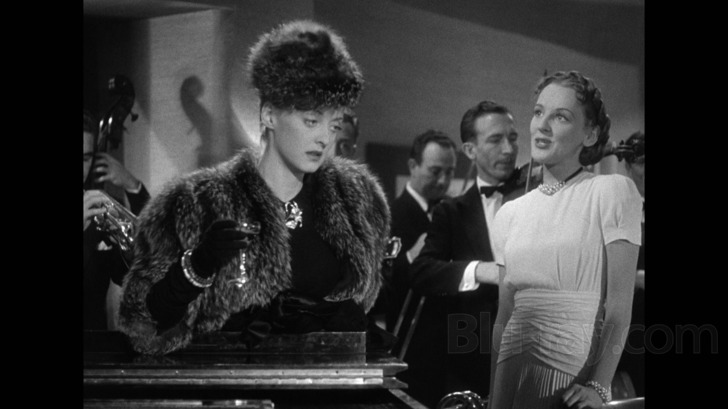
If Dark Victory had been made twenty years later, the director probably would have been Douglas Sirk, because the film fits comfortably into the genre of "women's pictures" with which Sirk is most identified. The story of a person dying young and having to grow up fast (and making others do so) remains a perennial in popular culture, and it is revisited regularly, often with startling success. It was the essence of Love Story (1970, both book and film); it was obviously central to Dying Young; and, most recently, it was revived to both critical acclaim and popular acceptance in The Fault in Our Stars. One could write an entire treatise on the cultural significance of this story line, but an essential point of reference would be Dark Victory. Despite weak sound, Warner's presentation is worthwhile and recommended.
Similar titles
Similar titles you might also like

Imitation of Life
1934

The Disappearance of Eleanor Rigby
Includes "Him", "Her", and "Them" Cuts
2014

Autumn in New York
2000

One Day
2011

New York, I Love You
2009

According to Greta
2009

Frankie and Johnny
1991

As Good as It Gets
Limited Edition to 3000 | SOLD OUT
1997

Latter Days
2003

My Blueberry Nights
2007

The Best of Everything
Limited Edition to 3000
1959

Gentleman's Agreement
Fox Studio Classics
1947

Zaza
1923

Jane Eyre
Limited Edition to 3000 - SOLD OUT
1943

Imitation of Life
1959

There's Always Tomorrow
1955

Now, Voyager
1942

Seven Pounds
2008

A Letter to Three Wives
Fox Studio Classics
1949

The Trail of the Lonesome Pine
1936
